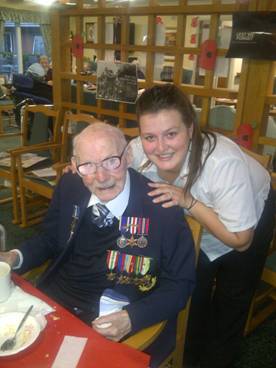Hall of fame: Whyburn Parkes
 Staff at Bupa’s West Ridings Residential and Nursing Home contacted us about World
War 2 hero Whyburn Parkes, after they held a Remembrance Day book reading event. Whyburn
featured in The Gazette in 1945, and we thought it was a story worth telling.
Staff at Bupa’s West Ridings Residential and Nursing Home contacted us about World
War 2 hero Whyburn Parkes, after they held a Remembrance Day book reading event. Whyburn
featured in The Gazette in 1945, and we thought it was a story worth telling.
Whyburn Parkes, who turned 100 in December 2014, was commemorated during WW2 for his brave actions intercepting German ships off the Norwegian coast.
A youthful desire for adventure had led Whyburn to join the Navy as a young man, for which he left his job as conductor for South Yorkshire Motors.
The attack
Whyburn became second senior gunner on the destroyer, Gurkha, and was the last of 3 men to leave the ship before it sank.
On 9 May 1940, about 10 miles off Bergen, Norway, an air alarm was sounded. 8 Heinkel bombers appeared, and 3 made power dives at a cruiser, which led to the Gurkha dropping back to take up another position. At the same time, one of the Heinkels dropped 2 bombs, which exploded just below the surface.
In Whyburn’s words, ‘The ship rocked like a cork, but there was no panic.’ The ship stayed afloat for a further 5 hours, and the foremost guns stayed intact, though 3 men had been injured and had to be treated in the mess, as the sick bay had been damaged.
In just over 3 hours, Whyburn managed to fire 758 shells, before the ship finally sank. He swam for half a mile in a gale until being picked up by the Aurora, captained by Commander Evans, and taken home to Pontefract, via Scotland.
The Gurkha was one of 9 destroyers lost to the Fliegerkorps X (10th Air Corps) during the Norwegian campaign of spring 1940, which was led by commander-in-chief of the home fleet, Admiral Sir Charles Forbes (GCB, DSO, Gazette supplement 34893).
Gazette recognition
Whyburn featured in the London Gazette in June 1945 (Gazette supplement 37119), and received a note of high appreciation from the First Lord of the Admiralty on 14 June 1945 for his bravery, which read:
‘By the King’s order the name of Petty Officer Whyburn Parkes, was published in the London Gazette on 14 June 1945, as mentioned in a Despatch for distinguished service. I am charged to record His Majesty’s high appreciation.
Brendan Bracken, First Lord of the Admiralty (Viscount Bracken, Gazette issue 39435)’
In 2014, Whyburn’s courage and efforts were celebrated by staff and residents at his Bupa care home at a special Remembrance Day event, in the same month as his 100th birthday celebrations.
Do you know a hero who was mentioned in The Gazette and whose story should be told? Get in touch via commissioning@tso.co.uk.
